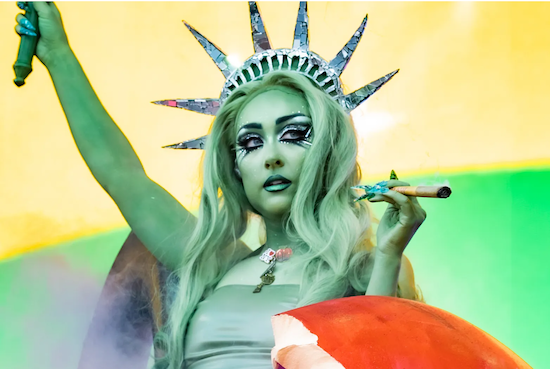
If you’ve been following the news about pop music or the music festival circuit this past year, you have probably heard of Chappell Roan. The campy, fired-up, 26-year-old pop star has erupted in popularity over the last six months. She has taken the world by storm and made everyone talk, both with praise and slander.
Whether you enjoy her music or not, Roan seems to bring a form of authenticity and originality to the popular music scene that has been missing for a while. She has her own distinct sound, a unique sense of style, and a recognizable image. She also has been doing something new that I have not seen a singer do for a long time: firmly setting boundaries.
In August, Roan released a series of TikTok videos, asking viewers if they would be upset if a random woman refused to take a photo with them. She asked whether they would harass her, yell at her from a car, or stalk her family. These videos polarized many fans, especially on X.
When Roan performs and dresses up in her theatrical outfits and over-the-top stage makeup, she’s at work and on the clock. That is not her entire life. When she is walking on the street or going around town, she isn’t performing, so she should not be treated like someone who is living to serve others.
Some fans of Roan felt that it was a good thing that she set boundaries, arguing that there have been too many instances in music history where that boundary being crossed resulted in violence against artists and even deaths, like the shooting death of Selena Quintanilla by her fan club president and the assassination attempt of Björk.
Others sympathized with her and believed that her reaction was due to a meteoric rise to stardom, but noted that taking pictures with her admirers and other fan service activities are an expected part of being famous.
Some, however, viewed her videos as a sign of weakness. They declared that she was “not ready” for fame and compared her to other pop stars, such as Lady Gaga, Katy Perry, and Taylor Swift, who have expressed unceasing gratitude for their fans and attributed their success to them. This controversy became more complicated when she canceled her performance at the All Things Go music festival in New York City, citing mental health concerns.
This starkly contrasts from the artistic commitment of her pop counterparts, like Katy Perry, who famously continued her concert after receiving a text from her husband at the time saying he wanted a divorce; Perry has also expressed suicidal thoughts while having to appear strong and fun-loving on stage, though her personal life was in turmoil. Or Lady Gaga, who arguably created the phenomenon of a social media fan base—the Little Monsters—who expressed early in her career that performance, high fashion, fame, and theatricality are her livelihood. Cut to a few years later when she, too, confessed she had everyday suicidal thoughts due to her fibromyalgia, her hatred of fame, and the lack of separation between her stage persona and personal life. She attributed the lack of separation to how people would come up to her for pictures when she was with family.
Or Ariana Grande, who embarked on her successful Sweetener tour despite dealing with her ex-boyfriend Mac Miller’s overdose and her separation from fiancé Pete Davidson. She later expressed that she was drinking heavily while on antidepressants at that time.
Due to social media, through which celebrities are more exposed than ever before, the boundary between celebrity and fan is getting blurrier. The era of music fandom is characterized by what I like to call “Twitter Swifties” (Swifties being fans of Taylor Swift, no disrespect to Taylor Swift), in which fans have developed a parasocial connection with the singer they are listening to. This leads to fans demanding things from celebrities, thinking that they know them personally, and believing they have a say in what they do with their personal lives. This also reminds me of how, in this wave of social media activism and virtue-signaling, people demand that celebrities speak up on politics and world issues and tell fans to “hold their favs accountable” for choosing not to. While celebrities raising awareness on social issues is admirable, their primary job is to entertain. It also shows our impressionability as well, as our dependence on celebrities gets us to care about what is going on in the world.
All of the reactions to Roan’s videos had me thinking: most of us are not in the music industry. We don’t know what it is like to be famous. Why are we telling someone we don’t even know how they should handle their fame?
Personally, I didn’t find anything wrong with Roan’s statements. She didn’t say that she never wants to take a picture with a fan, but that fans should not be upset if she declines. She does not owe them her time or pictures just because they listen to her music.
If Roan is able to recognize when she feels uncomfortable and establish that boundary and has already stated she is suffering from severe depression, why shouldn’t she establish them? It is because we expect singers to be our personal show ponies. Newsflash, singers are people too, and they don’t owe you SHIT.
Sam Goodykoontz can be reached at sgoodykoontz@wesleyan.edu.


Leave a Reply